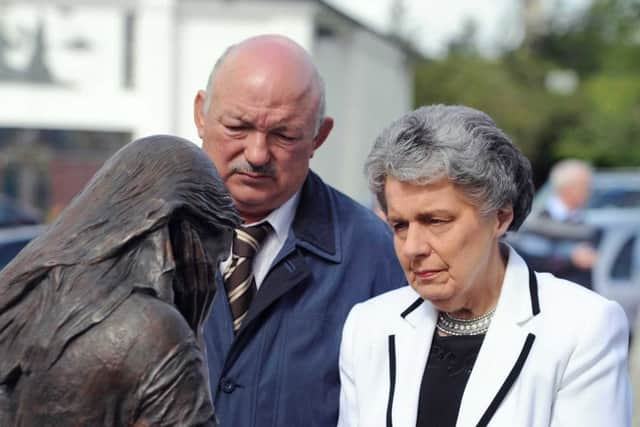--


Brian Walsh and Darren Poleon, both from Co Meath, will serve five years in prison each, plus five years on licence, for planting a remote-controlled bomb at the Waterfoot Hotel on the eastern side of Londonderry in October 2015.
It was hidden just ahead of a PSNI recruitment event at the venue – but this event had then been re-scheduled by police, out of courtesy to a wedding party who were using the hotel at the same time.
Advertisement
Hide AdAdvertisement
Hide AdJudge Geoffrey Miller told Belfast Crown Court he was giving the pair time off their sentence because they had pleaded guilty – though they had initially denied their crimes, and only changed their pleas seven months after telling the court they were not guilty.


DUP East Londonderry MP Gregory Campbell said such lenient sentencing would have been “highly unlikely” in any court in the rest of the UK.
And Claudy bomb survivor Mary Hamilton – former deputy mayor of Londonderry and a UUP councillor for the Waterside, where the bomb was found – said the sentencing in this case “does not fit the crime at all”.
She said that an appropriate term would have been more like 25 years in prison (with no 50% remission), given the possible “devastation” which could have ensued if the bomb had gone off.
Advertisement
Hide AdAdvertisement
Hide AdAs to what other dissidents may make of the sentences for Walsh and Poleon, she said it “more or less encourages them”.


She added: “They’ve no fear. They’ll go in for a few years and they’ll be out again, and do the same thing again.
“Why not commit crimes if you if you know you’ll only get a short sentence?”
Walsh and Poleon left their blast bomb in shrubbery behind a disabled parking sign, around 20 meters (65ft) from the lobby of the hotel.
Advertisement
Hide AdAdvertisement
Hide AdJudge Miller said the device was a modified fire extinguisher packed with one kilogram (about 2.2lb) of explosives, and had the potential to cause “severe physical injury or death... to members of the PSNI and others attending the hotel”.
It had been planted before the PSNI was due to hold a recruitment event at the hotel.
Once it was found, a controlled explosion was carried.
It was initially reported by police to have been an “elaborate hoax”, but was later revealed to have been viable.
The security alert which sparked its discovery was one of three; at the same time as the Waterfoot was searched on October 9, there were similar evacuations of buildings in Belfast and Omagh which had also been due to host PSNI jobs events.
Advertisement
Hide AdAdvertisement
Hide AdAll events had originally been scheduled for October 10, but shortly beforehand the PSNI decided to postpone the Londonderry event for a week.
The reason was because the Republican Network for Unity had planned a protest at the hotel on October 10, and since a wedding event was also being held at the venue that day (with guests coming from as far away as the USA), the PSNI moved the date.
In June this year, Poleon, 43 and from Lightown in Drumbaragh, Kells, and 35-year old Brian Walsh from Drumree in Dunshaughlin, both admitted possessing an explosive substance with intent to endanger life or cause serious injury to property, and possessing articles for use in terrorism. They had previously pleaded not guilty in November 2016.
Two other charges shared by both of them – conspiracy to cause an explosion and possesion of explosives in suspicious circumstances – were left on the books.
Advertisement
Hide AdAdvertisement
Hide AdThe prosecution had told the court how they came to the attention of police in Omagh after a car driven by Poleon was seen acting suspiciously on October 6, 2015.
The pair appeared nervous, and told police the had come to buy a car engine.
The vehicle was searched and balaclavas, bolt cutters, a two-way radio and a sat-nav were found.
The pair were arrested on suspicion of going equipped for burglary and bailed.
Advertisement
Hide AdAdvertisement
Hide AdWhen they returned to answer bail in December, they were held under the Terrorism Act.
The sat-nav was examined and showed that on October 6 the car had arrived at a roundabout close to the Waterfoot Hotel at 9.06pm, and was then turned off for 30 minutes – which the court was told was consistent with the bomb being placed in the car park.
Other data revealed a vehicle had been driven to two other venues – one in Belfast and one in Omagh – which were due to host PSNI events.
The court also heard examination of their phones showed they “at least supported the aims of a terrorist organisation”.
Advertisement
Hide AdAdvertisement
Hide AdPassing sentence, judge Miller said he was reducing their sentence from 13 years to 10 years due to their guilty pleas and the fact they crossed the border in December 2015 to answer their bail in Omagh.
Detective Chief Inspector Gillian Kearney said: “Their intention was undoubtedly to murder and seriously injure people as well as to deter people from pursuing a career in policing. They’d no regard for the safety of anyone staying in or visiting this popular hotel.”
Alderman Hamilton, who still endures the ill-effects of being injured in the IRA’s 1972 Claudy atrocity, said: “I’m suffering this day from the Claudy bombing, and all that happened there, and we’ve no justice.
“When you think what those boys could’ve done that night [at the hotel]... it’s too light a sentence, and should at least have been 25 years – and that’s 25 years inside.”
Advertisement
Hide AdAdvertisement
Hide AdDUP MP Gregory Campbell said: “Many people will question why two dissident republican terrorists will only serve five years in prison for planting a bomb that was intended to murder and maim.
“It is highly unlikely that anyone convicted of such a terrorist offence in any other part of the UK would receive such a lenient sentence.”
Asked about the rationale for the sentences and about the idea that they were too lenient, the Lord Chief Justice’s Office (representing the Province’s judiciary) responded with a statement it has issued before in response to similar requests.
It said in full: “Sentencing is a matter for each individual judge after consideration of the specific circumstances of each case.
Advertisement
Hide AdAdvertisement
Hide Ad“In calculating the appropriate sentence for the offence, the judge will have considered a range of factors specific to that case including the seriousness of the offence, the offender’s previous convictions, aggravating and mitigating factors, whether the offender pleaded guilty and at what stage in the process (a guilty plea at an early stage will attract a greater discount), the relevant law including the maximum sentence which the court can impose and any sentencing guidelines relevant to the offence committed.
“In many cases tried in the Crown Court, the Director of Public Prosecutions can refer the case to the Court of Appeal where he considers a sentence to be unduly lenient.”
Asked what their licence terms will be and about whether, given they normally live in the Republic, what arrangements might be for monitoring their licences, the Department for Justice said “licence conditions, including residency conditions, are informed by an individuals progress through custody and by the risk they are deemed to post to the public at the point of release.”.
The PPS was asked whether it would appeal the sentences but had not responded at time of going to press.